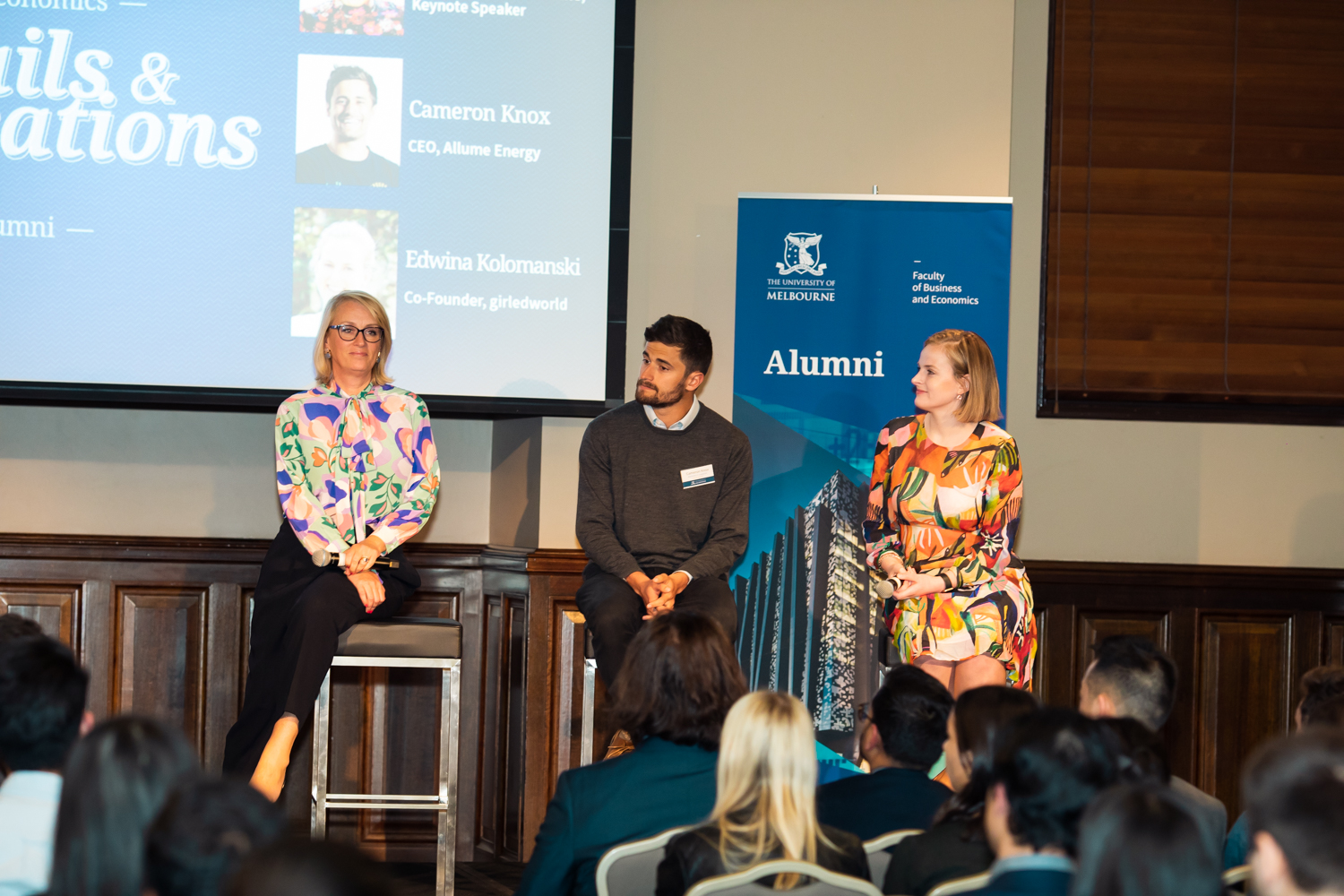Cocktails and Conversations: thinking about the future of Melbourne
By Seth Robinson
Every year the Faculty of Business and Economics opens its doors to its young alumni, bringing them together to celebrate their success and build a network that will support them into the future. This year, the Faculty and the Young Alumni Committee launched the inaugural “Cocktails and Conversations” event.
This year, for the first edition of “Cocktails and Conversations”, young alumni were presented with a series of speakers who offered their respective visions for the future of Melbourne. Lord Mayor Sally Capp, Allume Energy Co-Founder and CEO Cameron Knox, and girledworld Co-Founder Edwina Kolomanski all came together to offer insights into their experiences and share their ideas for an innovative, sustainable, and future-facing Melbourne. We spoke with Cameron and Edwina to find out more.
What are some of the insights you can offer on launching your startup and getting it off the ground?
Cameron: When I started, I really didn’t know what I was doing, which I think is pretty common for first time founders. Even if you’ve worked in a business before, it’s very different when you’re starting your own. It’s a lot like jumping into the fog in a lot of ways, even if you’re an industry expert. I studied science as a uni student, so it was a different skillset, but it informed my interest. In the end, we ended up going through the Melbourne Accelerator Program (MAP), that was kind of a critical moment for us, where we decided we were going to really go for it. I think having the support of that program and the network that comes with it was essential for us. It allows you the confidence to take that leap.
Edwina: There are definitely commercial and financial skillsets you need when it comes to running a business, they’re one, essential, part but then there’s a whole set of other skills that are so important in being a successful entrepreneur, like being consistent and persistent. It’s one thing to have a great idea, but you need to be able to learn the hard lessons and keep going or have a team who can support you when things are hard. If you don’t have that, it’s impossible. You need a good team.
Cameron: And you need to take that determination and commit to learning, you need to continue learning, all the time. You need to be able to change and embrace new iterations, and ultimately, a big part of your success comes down to luck.
Edwina: And timing.
Cameron : And timing. A big part of it is being ready and opening yourself up to those moments when you get lucky. The average startup takes 8-10 years to become successful, and 9 out of 10 actually fail. The exciting thing is, in Australia, we do have the ability to try things and fail, and still pick ourselves up and carry on with our lives. There’s a culture of acceptance when it comes to giving things a go, and there are less barriers to entry, especially in this age of doing things yourself. We also have a really strong support network in Melbourne right now, and I think it’s going to continue improving.
Both of your companies might be considered social enterprises, was making a positive social impact a major concern for you when you were developing your ideas?

Cameron: I think good business is about solving genuine, existing problems, so having a beneficial component is inherent in that. That said, that mentality that money and good are mutually exclusive is a challenge we’re always having to overcome, particularly when it comes to messaging, and who our audience is. For some audiences we focus on the business model, what the profit margin is, what’s the ability to scale it, what are the unique elements that allow us to be competitive, whereas when we speak to different audience, to a customer, we highlight the benefits, the impact. Ultimately, it’s always the same package, it’s just a matter of shifting the focus.
Edwina: I think a lot of people think that making money and doing good are mutually exclusive. For me, when I was studying at Wade, one of the things I discovered was that you can do good and make money at the same time. It’s just a matter of you solving a problem that’s painful enough for your users and customers, that they’re willing to pay for it, or there’s access to funding that will pay for it. I work in education technology, and one of the challenges we’ve run into is that people expect a lot of things for free in the education space. I guess what we’ve tried to prove over the last three and a half years is that if you’re solving a really painful or important problem, you can do good and be part of that solution while taking those financial considerations on board. For us, it’s thinking about the future of work and gender equity and making money at the same time.
Everyone has a different reason for wanting to be an entrepreneur and starting something. I think there needs to be more expression and exploration of who can be an entrepreneur, and just what an entrepreneur is, because who they are and what they look like is really diverse, it’s not all guys wearing hoodies in Silicon Valley.
Due to the generosity of alumni, this event raised over $2000 for first in family scholarships. Learn more about the scholarship here.